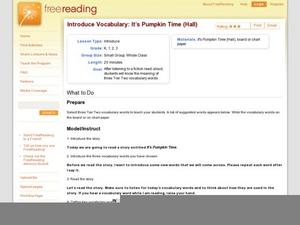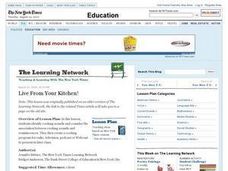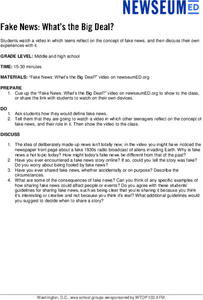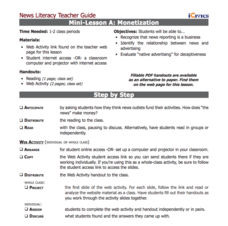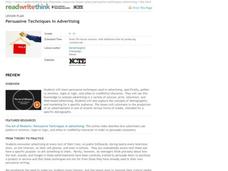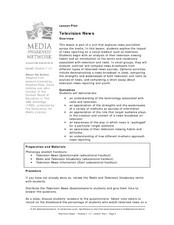Curated OER
Introduce Vocabulary: It's Pumpkin Time (Hall)
Looking for a Halloween-themed vocabulary activity? Study words in context using Zoe Hall's story It's Pumpkin Time, an excellent informational text for budding readers. The spooky suggested words are: buds, gather, hollow,...
Curated OER
Journalism: Underage Drinking
Students research underage drinking and read a report in the Journal of the American Medical Association about the issue. They interview experts on substance abuse and liquor store owners about their policies. Students publish their...
Curated OER
Be a Weather Newscaster
Ninth graders, in groups, create and videotape a news broadcast. Each group researches, develops and writes a weather forecast, a commentary on an environmental concern, a school activity and a commercial.
Curated OER
Back to the Past
What was the Untied States like in 1938? What were the concerns of Americans in the post World War I era? What were their fears? What were their sources of news and entertainment? To understand the reaction to Orson Welles' radio...
Newseum
When the News Media Make Mistakes
Mistakes happen. When they happen in news reporting, be it in print or on the internet, journalism ethics requires that the errors be corrected. Young journalists use an Accuracy Checklist to track how news organizations post corrections...
Curated OER
World War II
Sixth graders read Under the Blood Red Sun (UBRS), V is for Victory (V), and Number the Stars(NS). They examine WWII through the eyes of Japanese, Danish, and American students and complete at least two projects: a radio broadcast and a...
Curated OER
Live From Your Kitchen!
Students identify cooking sounds and share opinions about their associations. After reading an article, they discover the growth of radio cooking shows. They prepare an outline and script for a cooking program and present their...
Curated OER
How Media Shapes Perception
Students explain the impact that the media may have in shaping their intellectual and emotional responses to current events. They examine broadcast and Web-based news sites to find subtexts through the use of language, audio, and visual...
Media Smarts
Bias
See how bias operates firsthand. Half of the class reads one article while the other half reads another article on the same event. The obvious differences emerge when the two sides talk about their observations though. Several handouts...
Newseum
Media Ethics: Fairness Formula Starts With Accuracy
As part of a study of media ethics, young journalists apply a fairness formula to news reports. They look at accuracy, balance, completeness, detachment, and ethics to determine if the reporting is fair.
Newseum
Fake News — What's the Big Deal?
In a time of fake news and alternative facts, young people must have the ability to identify it and its role. Scholars watch a video of teens reflecting on the concept of fake news and the impact of sharing fake news stories. They then...
Newseum
'The Press and the Civil Rights Movement' Video Lesson
Scholars watch a video featuring journalists who covered the civil rights movement, then respond to questions on a viewing guide. The video features interviews with participants and original news footage from the 1950s and 1960s. In...
Newseum
Bias Through History: Analyzing Historical Sources
Young journalists use the E.S.C.A.P.E. (evidence, source, context, audience, purpose, and execution) strategy to evaluate historical and contemporary examples of bias in the news. The class then uses the provided discussion questions to...
Newseum
The Press and the Presidency: Friend or Foe? How the President Is Portrayed
In theory, news reports should be fair and unbiased. Young journalists test this theory by selecting a current news story covered by various media outlets about the President of the United States. They then locate and analyze five...
PBS
Decoding Media Bias
Alternative facts? After watching the We The Voters film, "MediOcracy," viewers compare how cable news outlets CNN, Fox News, and MSNBC report the same story about politics or public policy. After a whole-class discussion of their...
Curated OER
A Connecticut Yankee in King Arthur's Court
Students create a presentation in which they retell the events of A Connecticut Yankee in King Arthur's Court. In this A Connecticut Yankee in King Arthur's Court lesson plan, students are introduced to Mark Twain in a PowerPoint, then...
Curated OER
Using the Commentaries in Class
Students examine language and communication by listening to a commentary radio show. In this communications lesson, students listen to Michael Josephson's radio broadcast using the Internet and analyze his words and their meaning....
Curated OER
News Coverage
Learners compare and contrast methods of media coverage. In this media awareness lesson plan, students keep track of news regarding a world or national issue for the period of 1 week. Learners collaborate to describe the type of coverage...
iCivics
Mini Lesson A: Monetization
Advertising is everywhere! Does your class know that their attention span is for sale, even when they're watching a simple news story? The second installment in a five-part series from iCivics examines the relationship between news...
American Press Institute
Media Literacy: Where News Comes From
What actually happens at a press conference? Make sense of the mayhem with a mock press conference activity designed to promote media literacy. Individuals participate as either members of the press or the governor's office to examine...
Curated OER
Broadcasting the News Lesson 6
Students practice news reading at three words per second. They produce a news program while working as a team of reporters. They watch news clips of current reporters making a list of news reading tips. They play an online game that...
Curated OER
Walter Cronkite: Witness to History
Students brainstorm a list of news sources. They interview people about today's media and discuss their results. After watching segments of a film about Walter Cronkite, they role play as reporters and subjects from an historic period...
ReadWriteThink
Persuasive Techniques in Advertising
Help your 21st century learners develop their media smarts with this resource that has them examine the persuasive techniques advertisers use to influence specific demographics and then to use these techniques to craft their own ads.
Curated OER
Television News
Different media sources portray news in a variety of ways. In groups of three, learners look at different news sources, bringing in all the findings the next day. Three handouts help scholars compare sources, define specific terms used...
Other popular searches
- Public Broadcasting Service
- Broadcasting
- News Broadcast
- Television Broadcasting
- Broadcasts
- Broadcast Advances
- Broadcasting Activities
- Broadcasting Codes
- Radio Broadcasts
- News Broadcast Rubric
- History News Broadcast
- Radio Broadcasting


